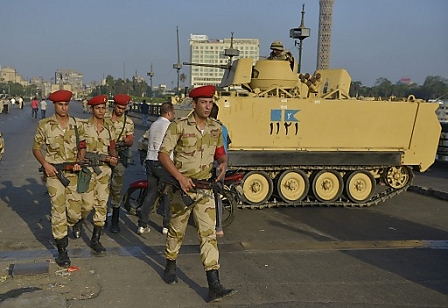Erstellt am: 8. 7. 2013 - 13:57 Uhr
People power vs. Democracy
Subscribe to the Reality Check podcast and get the whole programme after the show.
Any hopes that things would quieten down over the weekend in Egypt were short lived. In fact, things seem to be getting worse rather than better, and it's not hard to see why. Two very large and diametrically opposed civilian groups both claim to represent "the Egyptian people", and the army, which has both the fire power and the political power, claims to represent them all, or, at least temporarily, to rule them all. Any semblance of democracy has been suspended and clashes on the streets are pretty much inevitable.

EPA/YAHYA ARHAB
What is very hard to see, is where it can go from here that will make the future any more viable. What angered the anti-Morsi protesters was primaily Morsi's apparent lack of political and economic performance. Certainly, he made some unpopular moves and decisions, especially regarding the presidential powers and the constitution, but what really upset people was that fact that Morsi did not make life better for them. The cold fact is, that it was an impossible task.
Whichever way you look at it, Egypt is facing huge economic and social problems, and they are not going to be solved overnight. Let's assume for a moment that the army's "roadmap" goes to plan (there's no guarantee, but just say it does) and free and fair elections are held soon. Whoever is elected as the next president will face exactly the same problems as Mr Morsi did, whoever they are they will not be able to come up with a quick and easy solution either, and people expecting a quick and easy solution will be disappointed. If they then take to the streets, the cycle begins again. In a weird sort of way, the power of the people overturns the system of democracy.
There has been a lot of debate over whether this has been a "coup" or not - but whatever you call it, I think there is an important distinction between the fall of Morsi and the fall of Mubarak. Both faced huge popular pressure - but at the end of the day, albeit unwillingly, Mubarak resigned. Morsi has not resigned, and in his own eyes is still president. Morsi was removed by the military - and that creates a dangerous precedent. Inevitably, Egypt's next leader will not only have to lead a deeply divided population, they will also be looking over their shoulder to see if and when the military decides "the people" want a change. With a country so deeply divided, there will always be a large number of dissatisfied people, so that call becomes a very subjective one.
In today's Reality Check, analyst Paul Rogers, looks at the most recent developments and what they mean for the country's political future.
Dieses Element ist nicht mehr verfügbar
Pope Francis in Lampedusa
Pope Francis is making his first visit outside Rome, and has chosen the tiny island of Lampedusa, famous for being the first port of safety for refugees fleeing to Europe. Vatican correspondent, David Willey, discusses the significance of the trip and Pope's choice for the direction of this papacy.
Dieses Element ist nicht mehr verfügbar
FM4 Reality Check
Monday to Friday from 12.00 to 14.00, and after the show via Podcast or fm4.orf.at/realitycheck.


